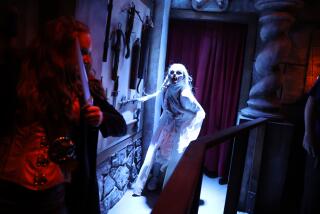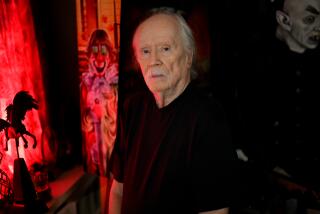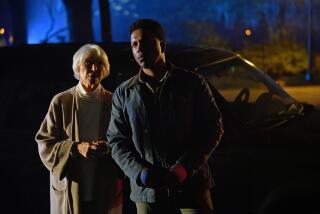An ‘Exorcist’ for All Time
Twenty-five years after it shocked audiences worldwide with the harrowing story of a little girl possessed by the devil, “The Exorcist” is still a rarity in the history of horror movies: The film doesn’t lose its power to evoke terror on a visceral level, even after repeated viewings.
Now, you can be horrified and informed: Warner Bros. has released a special edition of “The Exorcist” on DVD and laser disc, with a documentary about the film and other informational materials to enhance the viewing experience.
William Friedkin, the director responsible for bringing “The Exorcist” to movie life, will sign copies of both editions tonight at Dave’s Video in Studio City, a mecca for digital-format enthusiasts.
But the filmmaker, whose other pictures such as “The French Connection” and “Cruising” have given new meaning to the word “ominous” in film, is not participating in the 25th anniversary of “The Exorcist” out of nostalgia.
“I’m doing this because [DVD] is the best preservation medium there is,” Friedkin said last week in his office at Paramount Pictures.
“The nature of celluloid is that the images fade,” he explained. “The prints from the great films of all time are in bad shape. Even if you strike a new print, as we did for a new theatrical release of ‘The Exorcist’ in Europe, in a year or two those prints won’t be worth a dime. On the other hand, no one knows how long it’ll take for a DVD to wear out.
“And since [digital formats] are available to people at their homes, that becomes the medium of record, and not some film that’s lying in a basement somewhere.”
The director took advantage of this new video transfer to recreate the colors of the original print.
“I color-corrected every frame of the film,” he said proudly. “We cleaned it all individually. It had acquired dirt, scratches and started to fade. A lot of the scenes were mistimed to begin with.
“We corrected all that and made what I consider a pristine copy. This is not about nostalgia. The life of the film is embodied in this new medium.”
A brilliantly articulate man, Friedkin is as demanding a conversationalist as you are likely to find.
One of the most exciting features in the special edition is a commentary available on a separate audio track, on which he analyzes the movie scene by scene.
The director doesn’t waste any time in idle anecdotes, and aspiring filmmakers could learn a lot just by listening to his two-hour lecture on the making of the picture.
In retrospect, the early ‘70s were one of the happiest times in Friedkin’s career.
“I had a lot of ideas, and I was fortunate enough to have the time to attempt and execute them,” he said. “I wasn’t under any serious budget or time restrictions [in making ‘The Exorcist’]. I had a really great cast, the best script I’ve ever worked with, and a good crew.”
When Friedkin made that picture, he was barely 31 years old, which makes the gravity of style and the slow, assured pace of the final product even more remarkable.
But he is quick to brush aside talk of how young he was. “Look at ‘Citizen Kane,’ which was directed by a 25-year-old who had never directed a picture before,” he said.
Friedkin did admit, though, that he created a one-of-a-kind movie experience.
“It is paced and shot differently than films would be today,” he said. “But then again, I never thought of it in terms of a horror film. I don’t particularly like horror films and I didn’t pay any real homage to the genre with this picture. I think ‘The Exorcist’ transcends genres.”
After a long streak of winners during the ‘70s, which included a best director Oscar for “The French Connection,” Friedkin had difficulties during the ‘80s and the better part of the ‘90s.
“The Guardian,” his 1990 return to the horror genre, was critically panned, and most people said “Jade,” his underrated 1995 erotic thriller, was all style and no substance. “I never put any less effort into anything I do,” explained the director.
“Whether [my films] are successful or not is really out of my control. No one can really say, ‘Well, now I’m gonna make a hit,’ or, ‘Now I don’t think I’ll make a hit. I think I’ll make a flop.’ You just go out and make the best film you possibly can.”
And the director is about to do just that.
Now working on four projects simultaneously, he is especially enthusiastic about “The Diary of Jack the Ripper,” a fictional speculation on the mystery of the legendary serial killer, which he wrote himself and will be directing with European financing.
“In film, everything works together to produce an effect,” he said, talking about the many elements that contributed to the success of “The Exorcist.”
“There’s not one element that’s more important than the others. All of them work together in order to create or destroy a particular effect.”
More to Read
Only good movies
Get the Indie Focus newsletter, Mark Olsen's weekly guide to the world of cinema.
You may occasionally receive promotional content from the Los Angeles Times.










